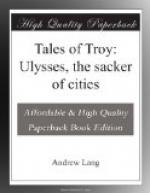As Ulysses was the grandson of Autolycus, the Master Thief, he often wished that the old man was with the Greeks, for if there was a thing to steal Autolycus could steal it. But by this time Autolycus was dead, and so Ulysses could only puzzle over the way to steal the Luck of Troy, and wonder how his grandfather would have set about it. He prayed for help secretly to Hermes, the God of Thieves, when he sacrificed goats to him, and at last he had a plan.
There was a story that Anius, the King of the Isle of Delos, had three daughters, named OEno, Spermo, and Elais, and that OEno could turn water into wine, while Spermo could turn stones into bread, and Elais could change mud into olive oil. Those fairy gifts, people said, were given to the maidens by the Wine God, Dionysus, and by the Goddess of Corn, Demeter. Now corn, and wine, and oil were sorely needed by the Greeks, who were tired of paying much gold and bronze to the Phoenician merchants for their supplies. Ulysses therefore went to Agamemnon one day, and asked leave to take his ship and voyage to Delos, to bring, if he could, the three maidens to the camp, if indeed they could do these miracles. As no fighting was going on, Agamemnon gave Ulysses leave to depart, so he went on board his ship, with a crew of fifty men of Ithaca, and away they sailed, promising to return in a month.
Two or three days after that, a dirty old beggar man began to be seen in the Greek camp. He had crawled in late one evening, dressed in a dirty smock and a very dirty old cloak, full of holes, and stained with smoke. Over everything he wore the skin of a stag, with half the hair worn off, and he carried a staff, and a filthy tattered wallet, to put food in, which swung from his neck by a cord. He came crouching and smiling up to the door of the hut of Diomede, and sat down just within the doorway, where beggars still sit in the East. Diomede saw him, and sent him a loaf and two handfuls of flesh, which the beggar laid on his wallet, between his feet, and he made his supper greedily, gnawing a bone like a dog.
After supper Diomede asked him who he was and whence he came, and he told a long story about how he had been a Cretan pirate, and had been taken prisoner by the Egyptians when he was robbing there, and how he had worked for many years in their stone quarries, where the sun had burned him brown, and had escaped by hiding among the great stones, carried down the Nile in a raft, for building a temple on the seashore. The raft arrived at night, and the beggar said that he stole out from it in the dark and found a Phoenician ship in the harbour, and the Phoenicians took him on board, meaning to sell him somewhere as a slave. But a tempest came on and wrecked the ship off the Isle of Tenedos, which is near Troy, and the beggar alone escaped to the island on a plank of the ship. From Tenedos he had come to Troy in a fisher’s boat, hoping to make himself useful in the camp, and earn enough to keep body and soul together till he could find a ship sailing to Crete.




